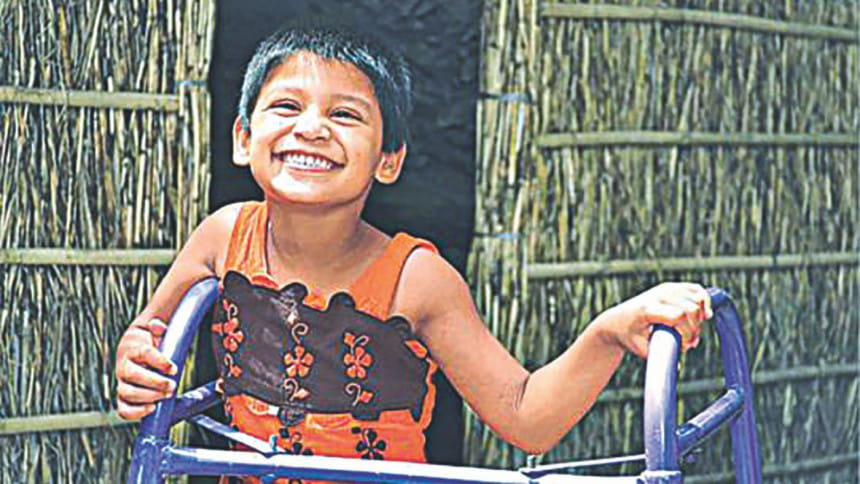Ensuring inclusion of persons with disabilities

Bangladesh has prioritised "disability" as one of the major thematic areas of its development agenda. The country has already put necessary policy frameworks in place to ensure disability-inclusive development. It has brought in legislation to protect people with disabilities, namely "Persons with Disabilities Rights and Protection Act 2013" and "Neurodevelopmental Disability Protection Trust Act 2013", and ensured inclusion of disability in its 7th Five Year Plan, National Education Policy, National Skills Development Policy, and other policy frameworks. Bangladesh has also ratified the UN Convention on the Rights of Persons with Disabilities (UNCRPD) and is highly committed to achieving Sustainable Development Goals by 2030, leaving no one behind, particularly those with disabilities.
Unfortunately, the National Budget for FY2018-19, placed during the 21st session of the 10th Parliament, has failed to uphold the government's commitment to ensuring their rights and entitlements. The proposed budget rather seems to reverse the shift from charity to rights-based entitlements, putting those with disabilities into the social welfare box and making their lives and development dependent on "allowances".
The budget speech by the finance minister has rather presented a philosophy and development approach contradictory to the government's own policy. It has neglected the necessity of universally accepted statistical numbers on persons with disabilities in Bangladesh. The reduced number that was given and the ensuing elation at the perceived success of related policy initiatives were based on a disputed survey on disabilities. The budget also revealed a focus on charity-based development rather than the rights-based approach promoted in the Persons with Disabilities Rights and Protection Act 2013, UNCRPD and SDGs.
True, the budget has increased allocations for cash transfer and in-kind services for persons with disabilities under social protection and social empowerment schemes. But it has failed to adequately uphold their rights and welfare with a proportionate and just allocation of resources among the competing, politically prioritised agendas within the sector.
For instance, the allowances for persons with disabilities and stipends for students with disabilities have increased in terms of coverage of beneficiaries as well as the sum of cash. The budget also has innovatively outlined a carrot-and-stick method—"carrots" by offering tax exemption on income from operating educational or training institutions for persons with disabilities and increasing the income tax threshold for persons with disabilities, and "sticks" by imposing 5 percent additional tax on medical service providers in case of failure to ensure access for those with disabilities to their medical services, to be effective from FY 2019-20. There is also an increased amount of resources allocated for social empowerment such as allocation for Neurodevelopmental Trust (from Tk 10.50 to 27.50 crore) and allocation for Bangladesh Autistic Academy (from Tk 5.36 to 30 crore).
However, the allocation and beneficiary coverage in terms of cash transfer and in-kind services, the policy measures to incentivise disability inclusion, and the increased resource allocation for certain social empowerment activities are not enough to address the needs of the persons with disabilities. The trend towards increasing allowances has rather cornered the development needs of the persons with disabilities, creating a "Disability Silo". The livelihood and development of those with disabilities has become solely dependent on allowances. Moreover, discriminatory resource allocation for specific types of disabilities has deprived others within the larger group of people with various types of disabilities, although the Persons with Disabilities Rights and Protection Act 2013 identified 12 types of disabilities and committed to ensure equitable development for all.
The proposed budget contains some fiscal policy measures to incentivise disability-inclusive service delivery in the medical sector, education, and vocational training for persons with disabilities. However, fiscal policy measures to incentivise disability inclusion in mainstream education, employment, livelihood development, disaster preparedness and risk management, and infrastructural development are absent in the budget.
Given the situation, we feel that the following issues should be considered in the national budget in order to uphold the rights of the persons with disabilities to development:
First, breaking the Disability Silo is necessary to ensure holistic development for the persons with disabilities in Bangladesh. Specific resource allocation or specific direction for disability-inclusive policies, and planning and implementation of development activities under each ministry can be useful in mainstreaming the development of persons with disabilities, rather than silo-ing it to the Ministry of Social Welfare only.
More fiscal policy measures should be introduced to incentivise disability inclusion in mainstream education (primary to tertiary), ensure accessible public places and infrastructure as well as accessibility, reasonable accommodation, non-discrimination and positive measures in employment. Also, consulting the persons with disabilities and DPOs can be helpful in facilitating their meaningful participation in the budgeting process to ensure the reflection of their demands. Introducing a systematic consultation process may be useful rather than doing it on an ad hoc basis every time.
A strong and appropriate monitoring mechanism for budget expenditure tracking should be introduced to monitor the extent to which the budget expenditure is impacting the livelihood and overall development of the persons with disabilities.
After all, disability-inclusive development policies and their proper implementation are necessary to uphold the rights of the persons with disabilities in Bangladesh. I think the actors and duty-bearers at the government and non-government levels should follow the twin-track approach to address the strategic needs and make specific interventions to ensure self-empowerment in development planning and implementation. Creating policy provisions, incentives and specific resource allocation in the national budget can be a starting point. If the Disability Silo can be broken down, disability can hopefully be mainstreamed to the resource allocation, planning and implementation of development activities of all the ministries, and a strong and appropriate monitoring mechanism can be established to track their impacts. Only then can we put meaningful efforts in achieving the Sustainable Development Goal of "leaving no one behind" in Bangladesh.
Asim Dio is an activist for the rights of persons with disabilities, and Advocacy and Communication Manager at CBM International, Country Coordination Office, Bangladesh.









Comments